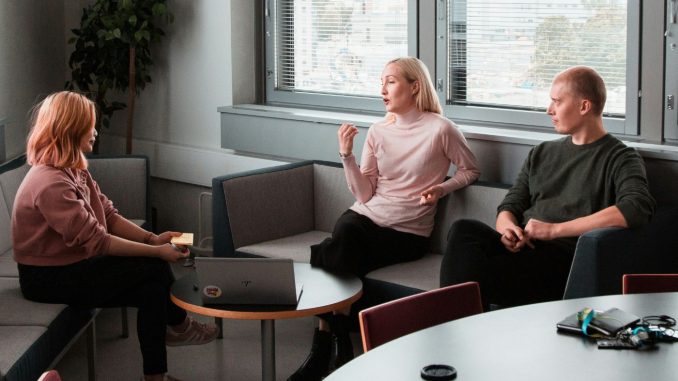
You have done a thorough market research, found a program that’s suitable for your goals, personal and financial situation, and duly completed your application form. An email comes in with congratulations and an invitation to an interview, so what’s next…? Today we will look at the preparations you need to make for your MBA interview, the way to go about of the whole process, questions you may expect and how to handle them correctly and what to do once the interview is over. In some cases, where schools simplify the admission process, submitting a complete and strong application and acing the interview is essential to secure a spot at a good business school with a recognized and accredited MBA program.
Application for an MBA program
Application form is one step which pre-determines one’s success at the interview. It gives an initial impression of the candidate’s suitability, their ability to comprehend information about what is required for submission and the way they are able to convey information in writing. This is very important as the more effort an applicant puts into the written application, the more substantial and also easier the interview will be – considering the application to be a written schematic of the conversation during an interview. As such, it is important to remember that tools like ChatGPT should not be used as application tools because almost certainly those applications will be caught out and rejected at some point. It’s about the applicant’s ability to tell their story, give examples of behaviors worthy of future leaders and problem-solving abilities. What stems from this is, one should also display integrity during the application process and take time preparing a strong application, submitting all required files. What matters a lot is the motivation letter where one can showcase their personality and cultural fit in written form as an “invitation” to discuss things further during the actual interview.
MBA admissions interview
Following from the application process, an interview is an opportunity to discuss the items mentioned in the written part. Typically, international MBA programs rely on interviews conducted virtually, as this provides greater flexibility and most of the time, they are either one-to-one interviews or panel ones with two or three interviewers. MBA interviews are sometimes conducted in-person however this becomes increasingly rare. Nonetheless, it is still important to remember that an interview will require the applicant to “make the effort”, dress formally and be on time. But first, it’s a good practice to respond to the interview invitation by email, acknowledging its receipt and confirming attendance or rescheduling if required. It’s also important to ensure one checks the time zone not to miss the opportunity and in case the applicant cannot make it to the interview, that an email is sent and rescheduling times are proposed in advance. These simple things, even in the case of a need to reschedule, show that the applicant is responsible and considerate. After all, non-attendance to an interview without communication means the school delegates two or three employees who will have to be paid for their time and accommodate an appointment that does not take place. Lack of communication or transparency is therefore a serious error one may make and this should be avoided at all costs.

An interview is an opportunity to showcase one’s personality, leadership potential and cultural fit. Just because an interview is online, does not mean one can appear in a hoodie with an unprofessional background or on-the-go. The candidate has to show respect to the interviewers and it is important to treat virtual interview with the same seriousness as one would treat an in-person one. Making sure one is in a quiet place with good internet connection and lighting helps the process and a formal dress code indicates the candidate’s seriousness. For cultural fit, knowledge of the school is fundamental including the school’s values, products, key people and the department basics. This is very important as again; it shows the applicant’s initiative and willingness to join this specific institution. In some cases, an interview may require a simple case study, where one is required to present the knowledge on a given topic. Details of the requirements will be provided in advance if the case study applies and it’s very important to comply with those, sending over deliverables in advance and preparing thoroughly for questions. If a case study element is involved, it may be that the panel will ask the candidate to show how they think outside the box which is why thorough preparation including the knowledge of latest business trends pays dividends.
Questions asked in the interview
When it comes to the questions asked during an interview, there will typically be a structure that’s quite common with Master’s interview questions. Applicants will be asked a set of questions focusing on behavior and motivations, followed by some questions related to experience and leadership potential. Typically, there are also questions focusing on the school to gauge the motivation of an applicant to study at a particular institution. They may be structured in this or any other way depending on the preferences of the interviewer however in general these areas would most likely be covered in more or less depth. In behavioral and motivational questions, one can often be asked about themselves which is an open question that has as an objective of expanding beyond the content of formal application. Whilst it can be the reiteration of those points, one should use the structure but go beyond what has already been written. In addition, the question serves as an opportunity to show the human side and it is the right place for the candidate to showcase how for instance their hobbies affect the way they work or think, how proactive an applicant is beyond the professional/educational sphere. However, by no means it is an opportunity to flood the committee with a list of things an applicant is into, but rather should serve as a way in which the applicant is able to showcase their character.
Another question asked often in MBA interviews is “What are your short and long-term goals?” which is aimed at learning about the applicant’s ability to set goals but also what the interviewer is looking for is the way in which, the person is able to execute daily work to achieve those. As such, mere listing of goals is insufficient to showcase one’s full potential and an additional exploration of the topic is advised, specifically describing the goal followed by the ability to indicate how one goes about fulfilling them. What can also be the case is that an applicant is asked why have they decided to take up an MBA. This is a very common question that taps into whether or not one’s decision has been thought through carefully because the last thing schools want are students who do an MBA degree just for the title or an idea that this will catapult them to executive positions. As much as an MBA helps reaching those positions in the longer term, such a pathway is not guaranteed and it takes years on the job in addition to an MBA to succeed in achieving such position. In an interview, this is a verification question to see if an applicant has got the right mindset on the studies and so this should be clearly laid out by the applicant as to why they think an MBA is good for them and they need it. The best possible answer to that stems from preparation and really thinking carefully as to why one might want or need an MBA at a particular point in their career. To handle those questions, having case studies can certainly make a difference and especially when it comes to behavioral questions such as “describe a situation where you had to lead an international team” – for those, it may be worth using the STAR framework. This helps to organize one’s thoughts by describing a situation, the task at hand, action that was taken and a result achieved. Although the framework may have limited impact on questions related to one’s goals or reasoning, when it comes to specific situations, it can make a very big difference.

Star technique could be a very useful tool when it comes to the experience and leadership questions that rely on exploring certain situations from the past of the applicant. The question on leading an international team above would be a perfect example, however in an MBA interview one can also expect more generic questions such as “How do you handle failure?” or “How do you cope with stressful situations?” In those cases, having a framework such as the star technique can help to structure one’s response and at the same time create an impactful story that is easier to follow and remember – something essential to think about when we want to make a lasting impression. When it comes to storyline, typical MBA interviews are rounded off with questions about the school where applicants may be asked about their contribution to the school community or why do they want to join a specific school. All of those should be easy to cover with preparation and research prior to the scheduled appointment.
Tips for a successful MBA interview
When it comes to tips for interviews, it is important to be prepared and this means dedicating time to finding out about the program, the school and opportunities within that can be anchor points for the conversation. An applicant should come up with a list of questions to ask the panel as this showcases one’s interest and preparation. Answers can be practiced with peers to give better confidence and they should be honest – being artificial and unprepared can be identified very quickly by the panel who very often conducts numerous interviews, in other words, there is no way to cheat through. During the interview, it’s best to stay natural, dress accordingly (formal attire recommended) and show active interest in the conversation. Respond concisely and don’t drift off with the answer in terms of time. MBA interviews are there not to catch out an applicant but to understand the motivations behind the application, this means an interview is in itself an opportunity to learn more about the school and the program in return for presenting oneself. After the interview, it is customary to send a thank-you email. This is recommended around 24 hours after it takes place as that way, an applicant gives the panel an opportunity to recall their conversation.
Conclusion
In conclusion, acing the interview is a pivotal step in securing a place on an MBA program. The process begins long before the interview itself, with a carefully completed application that reflects applicant’s goals, achievements, and unique personality. A well-prepared application serves as a blueprint for the interview, offering the panel insight into one’s character and leadership potential. To stand out, applicants should craft an application with integrity and attention to detail, showcasing their motivations and cultural fit. The interview is a chance to build on the application foundations, offering a deeper, more dynamic picture of who the applicant is. This is an opportunity to showcase leadership qualities, problem-solving skills, and ability to articulate goals clearly. Familiarity with common MBA interview questions—such as those about personal goals, leadership experiences, or how one handles challenges—is essential. Using structured approaches like the STAR technique can help crafting concise, impactful answers that highlight strengths and experiences effectively.
Equally important is thorough research about the school and program, as interviewers are keen to see genuine interest and how applicant’s aspirations align with what they offer in the program. Preparing thoughtful questions to ask the panel further demonstrates one’s commitment and curiosity, leaving a lasting impression. Professionalism is key throughout the process. Whether the interview is virtual or in-person, dressing formally, choosing an appropriate setting, and ensuring clear communication is not to be omitted. Applicant should also show enthusiasm and engage actively in the conversation while maintaining authenticity—panels can quickly identify rehearsed or insincere responses. Finally, it’s important not to overlook the value of a follow-up email, sent within 24 hours, to express gratitude and reinforcing interest. With preparation, authenticity, and attention to detail, an MBA interview can be turned into a powerful step forward in one’s career journey.

If you would like to find out more about the MBA, please take a look at our article “What is an MBA?”.




